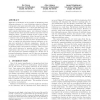Free Online Productivity Tools
i2Speak
i2Symbol
i2OCR
iTex2Img
iWeb2Print
iWeb2Shot
i2Type
iPdf2Split
iPdf2Merge
i2Bopomofo
i2Arabic
i2Style
i2Image
i2PDF
iLatex2Rtf
Sci2ools
173
Voted
SIGMOD
2005
ACM
2005
ACM
Reference Reconciliation in Complex Information Spaces
Reference reconciliation is the problem of identifying when different references (i.e., sets of attribute values) in a dataset correspond to the same real-world entity. Most previous literature assumed references to a single class that had a fair number of attributes (e.g., research publications). We consider complex information spaces: our references belong to multiple related classes and each reference may have very few attribute values. A prime example of such a space is Personal Information Management, where the goal is to provide a coherent view of all the information on one's desktop. Our reconciliation algorithm has three principal features. First, we exploit the associations between references to design new methods for reference comparison. Second, we propagate information between reconciliation decisions to accumulate positive and negative evidences. Third, we gradually enrich references by merging attribute values. Our experiments show that (1) we considerably improve p...
Attribute Values | Database | Literature Assumed References | SIGMOD 2005 | Standard Citation Dataset |
Related Content
| Added | 08 Dec 2009 |
| Updated | 08 Dec 2009 |
| Type | Conference |
| Year | 2005 |
| Where | SIGMOD |
| Authors | Xin Dong, Alon Y. Halevy, Jayant Madhavan |
Comments (0)

